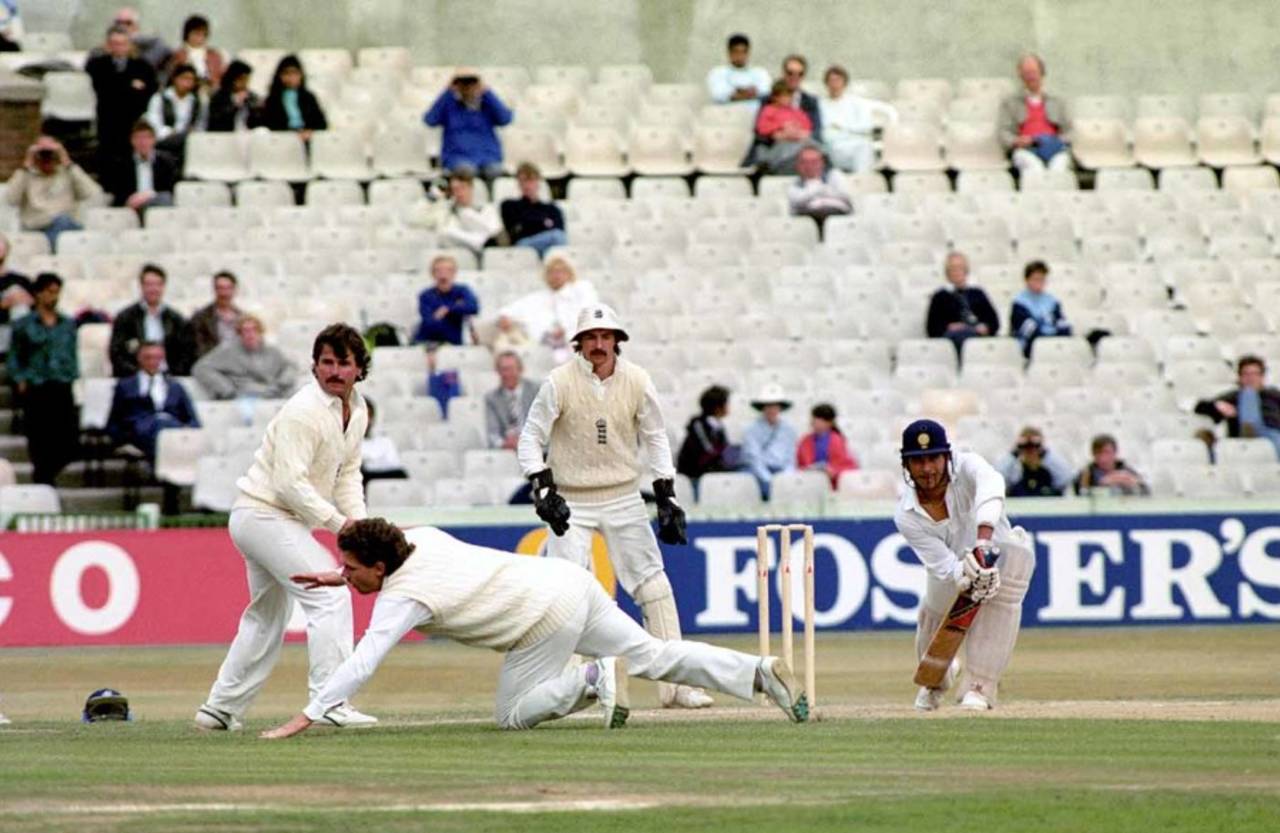ESPNcricinfo Awards 2013 cricketer of the generation: The 20-year dream
Sachin Tendulkar's career in cricket has been a testimony to his unflagging love for the game

Sachin Tendulkar scored his first Test hundred in 1990, at Old Trafford • PA Photos/Getty Images
Twenty years from now you will be more disappointed by the things that you didn't do than by the ones you did do, so throw off the bow lines, sail away from safe harbour, catch the trade winds in your sails. Explore, Dream, Discover.
- Attributed to Mark Twain
1993-2013: two decades of greatness
February 11-12, 1993: Scores his first Test century at home. Hits 24 fours and a six in his 165 against England.
March 27, 1994: Makes 82 off 49 balls opening in ODIs for the first time.
October, 1995: His Rs 31.5 crore contract with WorldTel makes him the world's richest cricketer.
February-March, 1996: With 523 runs at 87.16, he's the top scorer in the World Cup.
August 8, 1996: Named India captain at 23. Sacked 15 months later after India win three of 17 Tests under his leadership.
February-March, 1998: Gets his maiden first-class double-hundred, and two hundreds and a fifty, in three Tests against Australia.
April 22-24, 1998: Scores back-to-back ODI hundreds against Australia in Sharjah, in the "Desert Storm" series.
January 30-31, 1999: Makes 136 in the fourth innings in Chennai against Pakistan with an injured back. Gets out with 17 to win; India fall short by 13.
March 20, 2001: Scores a famous century in Chennai against Australia. India win the series 2-1.
March 31, 2001: Becomes the first player to score 10,000 runs in one-day cricket.
February-March, 2003: Scores 673 runs in the World Cup.
March 16, 2005: Becomes the fifth man to score 10,000 Test runs.
December 10, 2005: Becomes the leading centurion in Test cricket, overtaking Sunil Gavaskar's 34.
August, 2007: Makes 228 runs in his first Test series win outside the subcontinent, as India beat England 1-0.
January 4, 2008: Scores an unbeaten 154 at the SCG, his first century in more than two years and 19 Tests against opposition other than Bangladesh.
October 17, 2008: Breaks Brian Lara's record for most Test runs.
November 5, 2009: Goes past 17,000 ODI runs during his 175 off 141 balls in an unsuccessful chase of 351 against Australia in Hyderabad.
February 24, 2010: Becomes the first male player to score 200 in an ODI.
December 19, 2010: Becomes the first to score 50 Test hundreds, in Centurion.
April 2, 2011: Is part of a World Cup-winning team in his sixth attempt.
March 16, 2012: More than a year after scoring his 99th international hundred, Tendulkar gets his 100th, in an ODI against Bangladesh in Mirpur.
November 16, 2013: An emotional India bids farewell to Tendulkar on his home ground, the Wankhede Stadium. It's his 200th Test.
"The most important person in my life, and I have missed him a lot since 1999, when he passed away - my father. Without his guidance, I don't think I would have been standing here in front of you. He gave me freedom at the age of 11, and told me that [I should] chase my dreams, but make sure you do not find shortcuts. The path might be difficult, but don't give up. And I have simply followed his instructions. Above all, he told me to be a nice human being, which I will continue to do and try my best. Every time I have done something special [and] showed my bat, it was [for] my father."
Cricket is not just about performance. It's also about life. It's about how you leave an imprint on the young: the imprint of integrity, of honesty and of gratitude. Sachin Tendulkar lived this quality all his life
The jury that picked ESPNcricinfo's Cricketer of the Generation
1. Russel Arnold 2. Sambit Bal 3. Habibul Bashar 4. Ian Bell 5. Rahul Bhattacharya 6. Harsha Bhogle 7. Lawrence Booth 8. Geoffrey Boycott 9. Daniel Brettig 10. Mark Butcher 11. Ian Chappell 12. Aakash Chopra 13. Ed Cowan 14. Mike Coward 15. Tony Cozier 16. Martin Crowe 17. Daryll Cullinan 18. George Dobell 19. Rahul Dravid 20. Jeffrey Dujon 21. Ramachandra Guha 22. Gideon Haigh 23. Michael Holding 24. David Hopps 25. Tamim Iqbal 26. Mahela Jayawardene 27. Gaurav Kalra 28. Akram Khan 29. Athar Ali Khan 30. Younis Khan 31. VVS Laxman 32. Ranjan Madugalle 33. Sanjay Manjrekar 34. Suresh Menon 35. Andrew Miller 36. Mark Nicholas 37. Iain O'Brien 38. Mike Procter 39. Ramiz Raja 40. Barry Richards 41. Mark Richardson 42. Osman Samiuddin 43. Kumar Sangakkara 44. Mike Selvey 45. Ed Smith 46. Heath Streak 47. Mark Taylor 48. Sharda Ugra 49. John Wright 50. Waqar Younis
****
Martin Crowe, one of the leading batsmen of the late '80s and early '90s, played 77 Tests for New Zealand